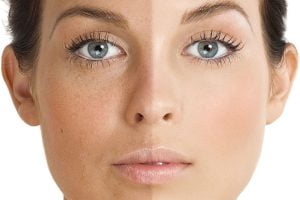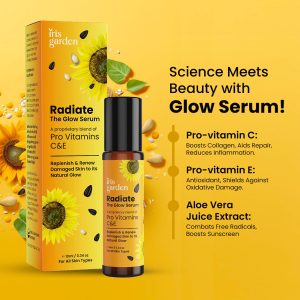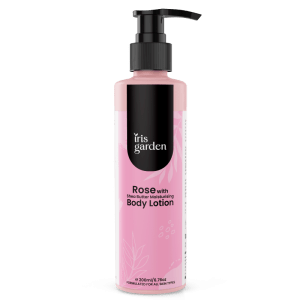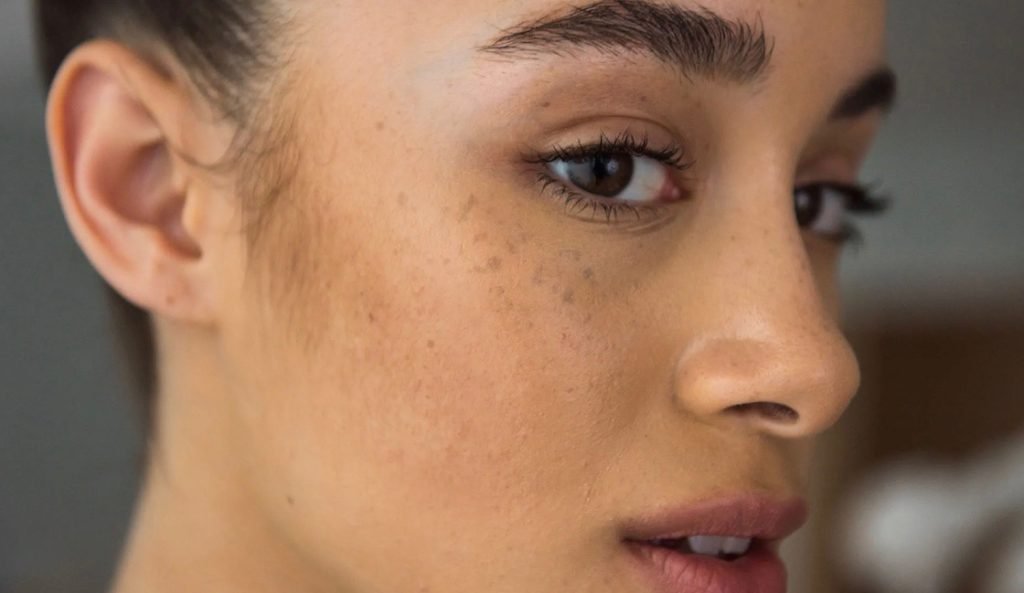No products in the basket.
Introduction:
Your skin is a reflection of your overall health and well-being, but sometimes it can be affected by pigmentation and discoloration issues. In this comprehensive guide, we’ll delve deeper into the different types of skin pigmentation disorders, their underlying causes, available treatment options, and how Iris Garden’s dermatology-grade skincare products can help address these concerns effectively.
Types of Skin Pigmentation and Discoloration:

Uneven Skin Tone:
Uneven skin tone, or hyperpigmentation, occurs when there is an increase in melanin production, resulting in dark patches and spots on the skin. Causes of hyperpigmentation may include hormonal changes, sun exposure, inflammation, and genetics. These dark spots are commonly perceived as “aged skin” and can contribute to an overall uneven complexion.
Treatment:
To address uneven skin tone effectively, a multi-faceted approach is often recommended. This may include incorporating corrective skincare products into your routine, such as serums containing ingredients like vitamin C, niacinamide, or alpha hydroxy acids (AHAs) to help brighten and even out skin tone. Additionally, regular exfoliation, sunscreen use, and targeted treatments like chemical peels or laser therapy can help reduce the appearance of dark spots and promote a more uniform complexion.
Post-inflammatory Hyperpigmentation:
Post-inflammatory hyperpigmentation (PIH) is a temporary darkening of the skin that occurs following inflammation or injury. Common triggers include acne breakouts, insect bites, burns, or cuts. PIH is more common in individuals with darker skin tones and can be a source of frustration for many.
Treatment:
The treatment of post-inflammatory hyperpigmentation often involves a combination of topical agents, such as hydroquinone, retinoids, corticosteroids, or botanical extracts like licorice root or kojic acid, to help lighten the darkened areas. Chemical peels, microdermabrasion, or laser treatments may also be recommended by dermatologists to accelerate the fading of PIH and promote skin renewal.
Melasma:
Melasma is a common skin condition characterized by brown or gray-brown patches, typically occurring on the face, particularly on the cheeks, forehead, upper lip, and chin. Hormonal changes, sun exposure, and genetics are believed to play a role in its development, making it more prevalent in women and individuals with darker skin types.
Treatment:
Management of melasma often involves a combination of preventive measures and targeted treatments. Sun protection is crucial, with broad-spectrum sunscreen and sun-protective clothing recommended to minimize UV-induced pigmentation. Topical treatments such as hydroquinone, tretinoin, or azelaic acid may be prescribed to lighten the patches, along with procedures like chemical peels, microdermabrasion, or laser therapy for more stubborn cases.
Skin Damage Leading to Loss of Pigmentation:
In some cases, physical trauma to the skin, such as burns, blisters, or infections, can result in the loss of pigment in the affected areas, leading to hypopigmentation or depigmentation. These lighter patches can be visually distinct and may take time to resolve.
Treatment:
Treatment options for skin damage-related pigmentation issues vary depending on the severity and extent of the condition. For mild cases, dermatology-grade creams and serums containing ingredients like retinoids, vitamin C, or niacinamide may help promote skin healing and reduce the appearance of scars and discoloration. In more severe cases, medical interventions such as laser therapy, microneedling, or surgical procedures may be recommended by healthcare professionals to restore skin pigmentation and texture.
Addressing Skin Concerns with Iris Garden:
Iris Garden is committed to providing dermatology-grade skincare solutions to help address a wide range of skin concerns, including pigmentation and discoloration issues. Our products are formulated with clinically proven ingredients to deliver visible results and promote healthier, more radiant skin.
Radiate – The Glow Serum:

Our potent antioxidant serum is designed to brighten and even out skin tone, revealing a luminous complexion. Formulated with ingredients like vitamin C, niacinamide, and hyaluronic acid, it helps to minimize dark spots, enhance skin radiance, and improve overall skin texture.
Revive – The Refreshing Face Wash:

Gently cleanse and purify your skin with our refreshing face wash. Enriched with botanical extracts and hydrating ingredients, it effectively removes impurities, excess oil, and makeup without stripping the skin of its natural moisture. With regular use, it leaves the skin feeling revitalized, refreshed, and ready to absorb the benefits of your skincare routine.
Rose with Shea Butter Moisturizing Body Lotion:

Nourish and hydrate your skin with our luxurious body lotion. Infused with the soothing scent of rose and enriched with shea butter, it provides intense hydration and long-lasting moisture, leaving the skin soft, smooth, and beautifully hydrated. Perfect for dry, rough skin, it absorbs quickly and non-greasy, making it ideal for daily use.
Conclusion:
Skin pigmentation and discoloration issues can impact your confidence and self-esteem, but with the right knowledge and skincare regimen, you can effectively manage these concerns and achieve healthier, more radiant skin. Whether you’re dealing with uneven skin tone, post-inflammatory hyperpigmentation, melasma, or skin damage-related pigmentation issues, Iris Garden’s range of dermatology-grade products is here to support you on your skincare journey. Remember to prioritize sun protection, adopt a consistent skincare routine, and seek professional guidance if needed to address your specific skin concerns effectively.
References:
https://www.hopkinsmedicine.org/health/conditions-and-diseases/skin-pigment-disorders
https://www.neostrata-me.com/learn-about-skincare/skincare-blog/types-of-skin-pigmentation

